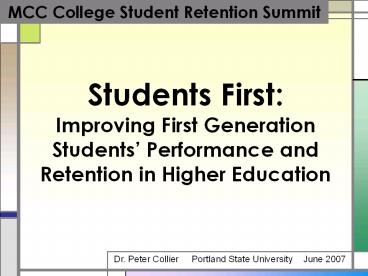Students First Mentoring Project PowerPoint PPT Presentation
1 / 28
Title: Students First Mentoring Project
1
MCC College Student Retention Summit
Students FirstImproving First Generation
Students Performance and Retention in Higher
Education
Dr. Peter Collier Portland State University
June 2007
2
(No Transcript)
3
Percentage of High School graduates who enter
college the Fall term following graduation
4
Percentage of High School graduates who enter
college the Fall term following graduation
5
Percentage of students who have either graduated
or persisted 5 years after entry
6
Percentage of students who have either graduated
or persisted 5 years after entry
7
- compounding issue of multiple group membership
Low Income Students
First-Generation Students
Students of Color
8
first generation students are most likely to be
- African-American or Hispanic
- Come from lower-income families
- Female, older, with dependent children
- Delay entry into postsecondary education
- Begin college at a 2-year institution
- Need remedial coursework
- Take classes part-time while working full-time
- Stop in and out of college
9
the issue of 1st year persistence
- students are most likely to drop out during their
first year - academic performance is closely associated with
1st year persistence - the lower the number of credits completed during
a students freshman year, the less likely that
student is to complete any type of certificate or
degree program
10
- models of persistence, performance, and success
11
Tintos Model of Persistence
Academic System
Family Back-ground
Individual attributes
drop out
decision
Pre-college schooling
Social
System
Tinto, 1975
12
Modified Model of Persistence
Drawn From Tinto 1975 and Guiffrida 2006
13
Two Path Model
Understanding of Professors Expectations
Students Abilities
Students Performances
Demonstrated Capacity
Cultural Capital
Actual Capacity
Academic Skills
Understanding of Course Material
14
- how can we improve success and retention for
under-supported students?
15
how can we improve success and retention for
under-supported students?
- students and their families need more useful
information about college, funding and finances,
early in the process of planning for college.
16
how can we improve success and retention for
under-supported students?
- 2) In order to increase the chances of being
successful academically once they enroll in
college, students must improve their relative
level of academic preparation before entering
college.
17
how can we improve success and retention for
under-supported students?
- 3) colleges need to provide community, in the
forms of a hospitable campus climate, as well as
opportunities to remain connected to cultural
communities.
18
how can we improve success and retention for
under-supported students?
- 4) In order to be successful, new first
generation, students need help navigating the
institution.
19
- Under-supported students benefit from having a
mentor -- someone who can translate the
expectations of college for the new student
20
Under-supported Transfer students
efficiency and effectiveness of
effort vs. persistence and course success
21
Students First Mentoring Program (SFMP) is a four
year pilot intervention --- supported by the U.S.
Department of Education and Portland State
Universitys Office of Student Affairs
designed to improve first generation student
retention at PSU
22
Areas of Program Emphasis
23
Points of Impact
Understanding of Professors Expectations
Students Abilities
Students Performances
A
B
Demonstrated Capacity
Cultural Capital
Actual Capacity
Academic Skills
Understanding of Course Material
24
SFMPs Fit Within the Modified Model of
Persistence
Drawn From Tinto 1975 and Guiffrida 2006
25
SFMP freshman persistence and performance
- Persistence
- 90 of SFMP freshmen who entered in the Fall 05,
were still enrolled in Spring 06 79 were still
enrolled in Winter 07. 2006-2006 Fall to Spring
retention rate was more than 16 greater than
the rate for all PSU freshmen, and was 24 higher
by Winter of the subsequent year - Performance
- GPA
- SFMP freshmen earned higher GPA for each term and
for the year - Credits Completed
- SFMP freshmen successfully completed more credits
for each term and for the year
26
SFMP transfer persistence and performance
- in 2005-2006, 14 transfer students participated
in SFMP - 86 persisted to Fall 05 Winter 06
- 79 persisted to Fall 05 - Spring 07
- GPA 3.27
- Avg Credits Completed 35
27
What can YOU doto Put Students First?
28
Dr. Peter Collier Associate Professor of
Sociology Principal Investigator Students First
Mentoring Program cfpc_at_pdx.edu 503-725-3961
Collin Fellows Program Manager Students First
Mentoring Program studentsfirst_at_pdx.edu 503-725-53
07

